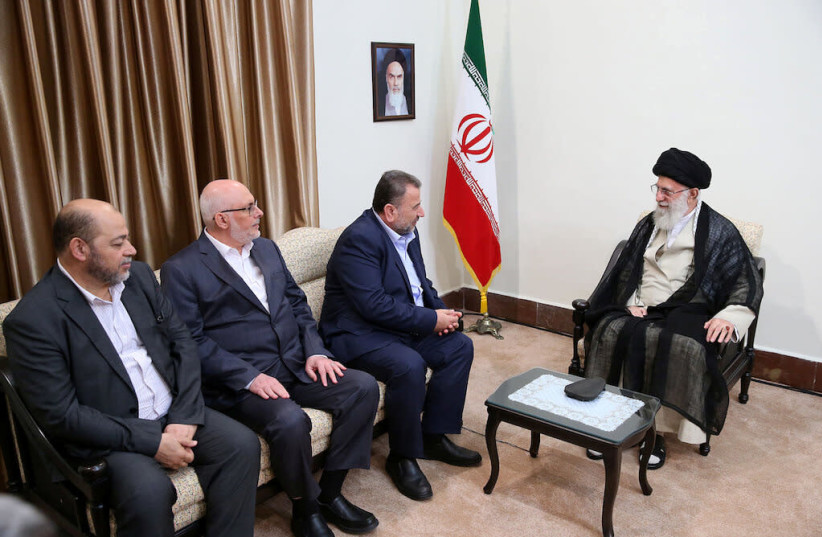While Israel is still trying to clear the South of Hamas terrorists who infiltrated since early Saturday morning, it may seem premature to discuss the future stages of this war.
An argument can be made: first, let’s regain complete control of our own territory, and then talk about taking the war to the enemy. But Israel will regain control of the South, will wipe out the terrorists there, and then will begin an offensive in Gaza.
But will that be the end of it? Or should Jerusalem decide that the time has come to somehow take the terrorist battle with organizations funded and supported by Iran to Iran, to somehow make the Ayatollahs pay for their support of organizations bent on murdering Jews and Israelis?
On Thursday, just two days before the October 7 attacks, Prime Minister Benjamin Netanyahu issued a statement in response to five border police officers wounded while trying to arrest a terrorist suspect in Tulkarem.
“We hold Iran directly responsible for the wave of terrorism in Judea and Samaria, in encouraging and financing murderous operations against the citizens of Israel,” he said. “The Government of Israel will fight terrorism with determination and defend the citizens of Israel.”
Netanyahu’s mention of Iran in this context illustrated that Israel believes Iran is playing a much more active role in supporting, training, funding, and encouraging terrorism against it.

Hamas, PIJ, and PFLP meet with the Islamic Republic
Last week, a senior Hamas commander was in Tehran with other Hamas figures and leaders of Palestinian Islamic Jihad (PIJ) and Popular Front for the Liberation of Palestine. Similar meetings between terror leaders and Iranian officials also reportedly took place last week in Damascus and Beirut.
And on Saturday, Hamas spokesman Ghazi Hamad told the BBC that the terrorist organization had direct backing from Iran for Saturday’s brutal attack in the South.
While Iran has long been providing support to Palestinian organizations, Tehran has an added incentive now to support this terrorism in the hopes that it will derail a budding Saudi Arabia-Israel normalization deal.
For Iran, a fierce Israeli response serves Iran’s purposes because it will fill the Arab and Islamic world with images of Israeli warplanes bombing Gaza, inevitably triggering pressure both within Saudi Arabia and from around the Islamic world not to sign a deal with a regime attacking the Gaza Strip.
Netanyahu’s accusation against Iran on Thursday was not the first instance time he has done so recently, as both he and Defense Minister Yoav Gallant have blamed Iran for terrorist involvement here a number of times in the past few months.
After Palestinian terrorists murdered Batsheva Nigri near Hebron in late August, Netanyahu and Gallant went to the site of the attack and accused Iran.
“We are in the middle of a terrorist onslaught that is encouraged, guided, and funded by Iran and its proxies,” Netanyahu said. “A significant portion of this wave of terrorism came from external guidance.” He said Israel “will use additional means of attack and defense to make the terrorists pay, along with those who send them, near or far.”
Gallant added that the current wave of terror “Is all guided by Iran, which is looking for any way to harm Israeli citizens.” Without providing any details, he said Israel “will take additional actions that will ensure the security of Israeli citizens and make those responsible pay a price.”
So already in August, Netanyahu and Gallant issued veiled threats against Iran that they would be held responsible and pay a price.
Yet, up until now, no such price has been extracted. The question in light of Saturday’s massive attack is whether the sheer magnitude of this attack will compel the IDF to send a military message to Iran.
Back in 2018, when he was Education Minister, Naftali Bennett propounded a theory of how to deal with aggression from Iran, which he termed the “octopus doctrine.”
“The Iranians don’t love dying, but it is very easy for them to send others to die,” he said. “While we’re shedding blood fighting their tentacles, the octopus’s head is lounging in its chair, enjoying itself.” Bennett’s conclusion: it was time for Israel “to aim at the head of the octopus and not its tentacles.”
Though at the time Bennett’s words were directed toward Iran’s malign designs in Syria, in light of Saturday’s staggering attack and the likelihood that Iran helped to train, coordinate, and finance it, might this doctrine now apply to this type of terrorism as well?
